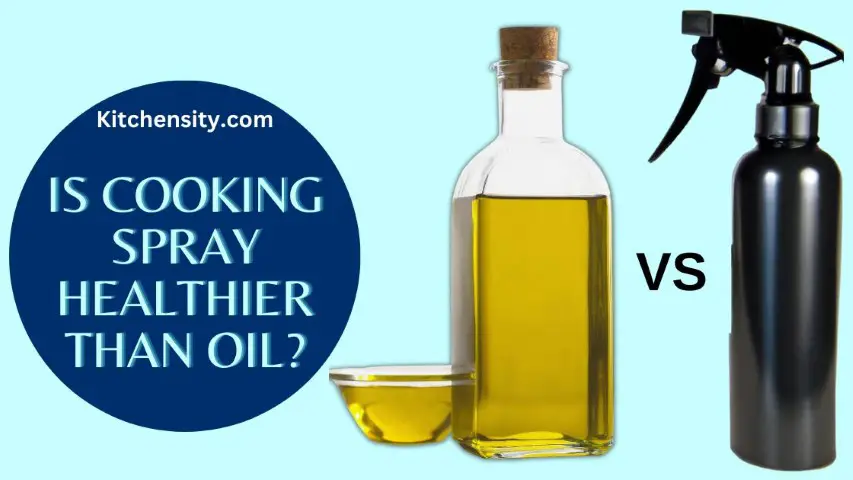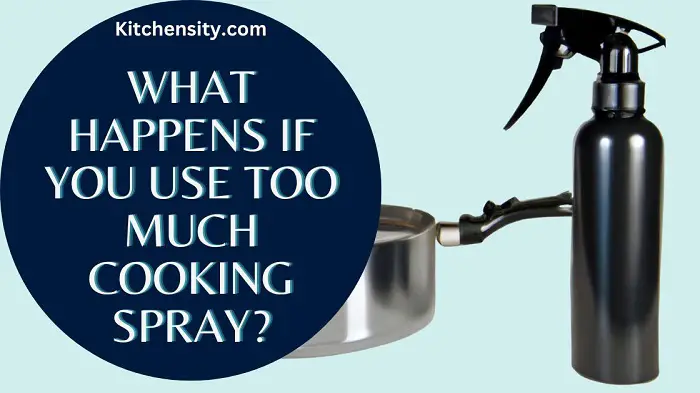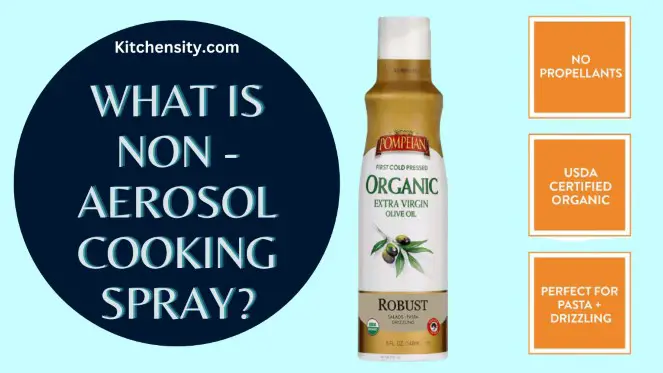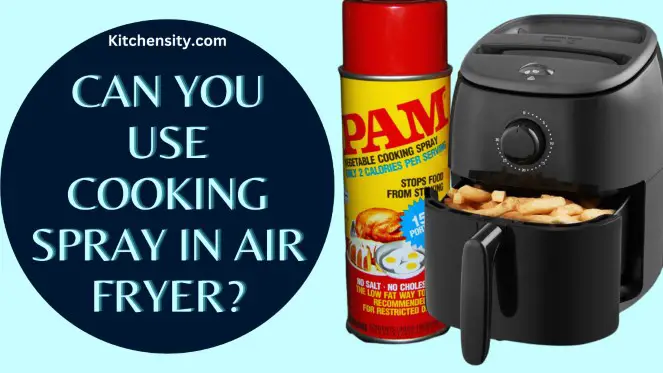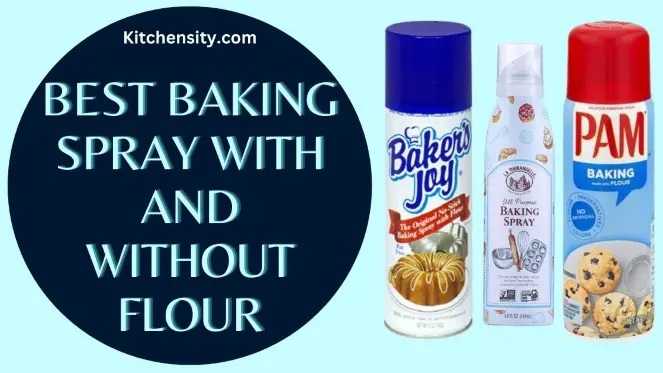The cooking spray has long been promoted as a convenient and low-fat alternative to traditional cooking oils, appealing to health-conscious individuals looking to reduce their fat intake. However, as with many food products, there is ongoing debate and concern regarding its potential impact on health.
Here, we’ll explore the question of whether cooking spray causes cancer or is bad for you. We’ll examine its nutritional profile, potential health risks, and environmental considerations to provide a comprehensive understanding of this commonly used kitchen product.
By the end, you will have a clearer understanding of cooking spray’s role in your kitchen and how to make informed choices about its use in your cooking practices.
Table of Contents
- 1 What Is A Cooking Spray?
- 2 Is Cooking Spray Bad For You?
- 3 Does Cooking Spray Cause Cancer?
- 4 Are Cooking Sprays Healthy?
- 5 Can You Spray Cooking Spray Directly On Food?
- 6 What Are The Health Concerns Associated With Cooking Spray?
- 7 Why Aerosol Cooking Sprays Are Not Recommended?
- 8 Questions About PAM Cooking Spray
- 9 Questions About Canola & Olive Oil Cooking Spray
- 10 Is Dimethyl Silicone Safe To Eat?
- 11 6 Safe Alternatives To Cooking Spray
- 12 What Is The Healthiest Cooking Spray To Use?
- 13 Tips For Using Cooking Spray Safely
- 14 Final Thoughts: Is Cooking Spray Bad for You?
- 15 Frequently Asked Questions (FAQs)
What Is A Cooking Spray?
Cooking spray is a product used in cooking and baking to prevent food from sticking to cooking surfaces, such as pans, baking sheets, or grills. It typically comes in an aerosol can and is sprayed onto the cooking surface in a thin layer. It is designed to provide a non-stick coating, making it easier to cook and clean up afterward.
Cooking spray is often used as a convenient alternative to traditional liquid oils or solid fats, as it can be applied precisely and evenly without the need for additional utensils. Cooking sprays are available in various formulations, including those made from different types of oils or with added flavorings.
Is Cooking Spray Bad For You?
According to the Food and Drug Administration (FDA), cooking spray is considered safe for consumption and is not bad for you. There doesn’t seem to be any evidence that it poses a risk to human health. However, some cooking sprays contain diacetyl which can cause serious respiratory disease with long-term or repeated exposure.
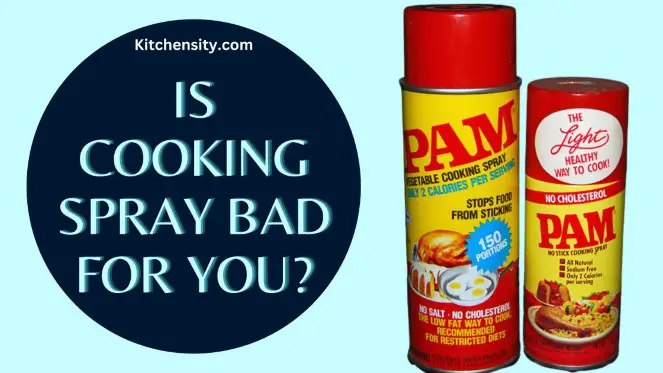
The safety of cooking spray depends on various factors, including its ingredients, usage, and individual health considerations.
- Nutritional Content: Cooking sprays are often marketed as low-fat alternatives to traditional oils, but it’s important to check the nutritional label for specifics. Some sprays may contain propellants or other additives that contribute to the overall nutritional content.
- Ingredients: Ingredients in cooking spray can vary widely. Some contain oils like canola or olive oil, while others may include additional additives. It’s essential to be aware of the ingredients and consider any dietary restrictions or sensitivities.
- Health Considerations: While cooking sprays are generally safe when used in moderation, concerns have been raised about certain ingredients like propellants or emulsifiers. Research on the long-term health impacts of these ingredients is ongoing.
- Usage and Safety: Proper usage is crucial to minimize risks. This includes using the spray in a well-ventilated area, avoiding spraying near open flames, and proper storage.
- Alternatives: If you have concerns about the ingredients, there are alternative options like traditional oils or solid fats. These may offer different nutritional and flavor profiles.
Using cooking spray in moderation and in a well-ventilated area can help reduce potential risks associated with its use. If you do use nonstick cooking sprays, it’s advisable to store them in a cool, dark place, similar to how you would store any cooking oil.
Also Read – Does Pam Cooking Spray Contain Butane?
Does Cooking Spray Cause Cancer?
There’s no straightforward answer to whether cooking spray causes cancer, as the current evidence is inconclusive. While some concerns have been raised, particularly regarding specific ingredients and potential risks under certain conditions, the overall picture remains complex and requires careful consideration.
Some studies have suggested that certain components of cooking sprays, such as propellants or emulsifiers, may have the potential to contribute to cancer risk. However, the evidence is not conclusive, and more research is needed to fully understand any potential associations between cooking spray use and cancer.
It’s important to note that the FDA has approved the use of cooking spray ingredients as safe for consumption when used according to the manufacturer’s instructions. As with any food product, using cooking spray in moderation and following recommended usage guidelines can help minimize potential risks.
Currently, there is no strong evidence directly linking the regular use of cooking spray to an increased risk of cancer in humans. Most studies focus on occupational exposure to cooking oil fumes in professional kitchens, which is a different scenario than occasional home use. Even with potential concerns, the amount and manner of using cooking spray are crucial factors. Overheating, inhaling large amounts of spray, and using outdated products can increase potential risks.
It’s always wise to be mindful of ingredients, proper usage, and alternative options. If you have concerns, consult a healthcare professional or registered dietitian for personalized advice.
Are Cooking Sprays Healthy?
The healthiness of cooking sprays depends on factors like their ingredients, usage, and individual dietary needs. They are often low in calories and fat, making them a convenient option for reducing fat in cooking. However, it’s important to check the nutritional label for specifics and use them in moderation. Some cooking sprays may contain additives or propellants, so being aware of the ingredients is important. Alternatives like traditional liquid oils or solid fats are also available and should be considered based on individual preferences and dietary requirements.
Here are some key points to consider:
- Calorie and Fat Content: Cooking sprays are often marketed as a low-calorie and low-fat alternative to traditional oils. However, it’s important to check the nutritional label, as some cooking sprays may still contain significant calories and fat per serving. While they can be a useful tool for reducing overall fat intake, moderation is key.
- Ingredients: The ingredients in cooking sprays can vary widely. Some may contain oils like canola, soybean, or olive oil, while others may include additional additives or propellants. It’s important to be aware of the ingredients and consider any dietary restrictions or sensitivities.
- Usage: Using cooking sprays in moderation and according to the manufacturer’s instructions can help ensure their effectiveness and safety. Overuse or improper application may lead to excessive calorie or fat intake, so it’s important to use them sparingly.
- Alternatives: While cooking sprays can be convenient, there are alternative options like traditional liquid oils or solid fats. These alternatives may offer different nutritional profiles and flavor profiles, so it’s essential to choose based on your specific needs and preferences.
Also Read – Is Cooking Spray Healthier Than Oil?
Can You Spray Cooking Spray Directly On Food?
Cooking spray is intended to be sprayed onto cooking surfaces like pans, baking sheets, or grills to prevent food from sticking. It is not typically meant to be sprayed directly onto food, especially if the food is already cooked or ready to eat. Spraying cooking spray directly onto food may result in an uneven distribution and could alter the taste or texture of the food. Instead, it is best to apply cooking spray to the cooking surface before adding the food for cooking or baking.
What Are The Health Concerns Associated With Cooking Spray?
Health concerns associated with cooking spray include potential risks from additives like propellants and emulsifiers, inhalation of aerosol particles during use, and the overuse of fat substitutes leading to dietary imbalances.
- Additives: Some cooking sprays contain additives such as propellants, emulsifiers, and anti-foaming agents, which are used to improve the product’s performance. There are concerns about the potential health effects of these additives when consumed in large quantities or over long periods.
- Chemical Exposure: Aerosol cooking sprays release fine particles into the air, which can be inhaled during use. While the health risks of short-term exposure are minimal, long-term inhalation of these particles may pose respiratory risks.
- PTFE/PFOA: While most reputable brands have phased out PFOA from their manufacturing process, some concerns remain regarding trace amounts or older products. PFOA has been classified as “probably carcinogenic to humans” by the IARC.
- Acrylamide: High-heat cooking of any oil, including those in sprays, can generate acrylamide, a potential carcinogen. The amount formed in spraying is likely minimal compared to other cooking methods like frying, but still noteworthy.
- Overuse of Fat Substitutes: Cooking sprays are often used as a low-fat alternative to traditional oils. However, excessive use of fat substitutes like cooking sprays may lead to an imbalance in dietary fat intake, which can affect overall health.
- Environmental Impact: The propellants used in aerosol cooking sprays can contribute to environmental pollution if not properly managed. While newer formulations use more environmentally friendly propellants, the overall environmental impact of cooking sprays remains a concern.
It’s important to note that while these concerns exist, cooking sprays can still be used safely when used in moderation and according to the manufacturer’s instructions.
Also Read – What Happens If You Use Too Much Cooking Spray?
How Can I Minimize The Health Risks Associated With Cooking Spray?
To minimize the health risks associated with cooking spray, choose products with simple ingredients, use them in moderation to avoid excessive intake of additives or fats, and ensure proper ventilation during use to minimize inhalation of aerosol particles.
Also, consider the following tips:
- Read Labels: Choose cooking sprays with simple ingredients and avoid those with additives like propellants or emulsifiers if you have concerns about their health effects.
- Use in Moderation: Use cooking spray sparingly to minimize the amount of aerosolized particles released into the air and to avoid excessive fat intake.
- Ventilation: Use cooking spray in a well-ventilated area to reduce the inhalation of aerosol particles.
- Storage: Store cooking sprays in a cool, dark place to maintain their quality and minimize the degradation of any sensitive ingredients.
- Consider Alternatives: If you’re concerned about the potential risks of cooking spray, consider using alternative methods for greasing pans, such as using a small amount of liquid oil applied with a brush or paper towel.
Why Aerosol Cooking Sprays Are Not Recommended?
Aerosol cooking sprays are not universally considered bad, but they do have some drawbacks that make them less than ideal for some people and situations. Here are some reasons why they might not be recommended:
- Potential Carcinogens: Some older sprays might contain trace amounts of PFOA, linked to cancer, though most reputable brands have phased it out. Additionally, high-heat cooking with any oil can generate acrylamide, a potential carcinogen.
- Propellants: Inhaling large amounts of propellants like butane or propane can be harmful, especially for people with respiratory issues.
- Additives: Some sprays contain additives like lecithin and emulsifiers that may raise concerns for individuals with allergies or sensitivities.
- Hidden sugars and sodium: Some flavored sprays have added sugars and sodium, contributing to health problems like obesity and high blood pressure.
- Overuse: It’s easy to overapply with sprays, leading to unwanted calorie intake and potentially unhealthy fat consumption.
- Lower oil quality: Some sprays use lower-quality oils compared to what you might use in a bottle.
- Environmental impact: Aerosol cans have a larger environmental footprint compared to refillable options.
- Cost: Sprays can be more expensive than using a bottle of oil and a brush.
- Less control: It’s harder to control the amount of oil used with sprays.
Whether or not to use aerosol cooking sprays is a personal decision. If you have health concerns or prefer a more natural approach, consider alternative methods. However, if you use sprays occasionally and choose healthy oils, they can be a convenient tool.
Remember, a balanced diet with a variety of healthy cooking methods is crucial for overall well-being.
Also Read – What is Non-Aerosol Cooking Spray?
Questions About PAM Cooking Spray
Does Pam Cooking Spray Cause Cancer?
There is no definitive scientific evidence to suggest that Pam cooking spray specifically causes cancer. However, some concerns have been raised about the potential health effects of certain additives or propellants used in aerosol cooking sprays, including some formulations of Pam. These concerns are based on studies that have examined the health impacts of individual ingredients found in cooking sprays, but conclusive evidence linking Pam cooking spray to cancer is currently lacking.
It’s important to note that the Food and Drug Administration (FDA) regulates the safety of food products, including cooking sprays, and has approved the use of the ingredients in Pam cooking spray as safe for consumption when used according to the manufacturer’s instructions.
So, the current evidence lacks a definitive link between Pam cooking spray and cancer risk in humans. However, practicing healthy usage habits like moderation, choosing healthier oils, and considering alternatives can help minimize potential risks and promote overall well-being.
If you have specific health concerns about cooking sprays or are seeking advice on their use, it’s best to consult with a healthcare professional for personalized guidance based ovidual health status and risk factors.
Also Read – Can You Use Cooking Spray On A Cast Iron Skillet?
Is Pam Cooking Spray Bad For You?
Pam cooking spray, like other aerosol cooking sprays, is safe for consumption when used in moderation and according to the manufacturer’s instructions. It contains additives such as propellants and emulsifiers, which are considered safe for consumption in small amounts by regulatory authorities. While there are some concerns about the inhalation of aerosol particles during use and the environmental impact of propellants, these risks are generally low when the product is used as directed.
However, individuals with specific health concerns or dietary restrictions may prefer to use alternative methods for greasing pans, such as applying liquid oil with a brush or paper towel. As with any food product, it’s important to consider your individual health needs and consult with a healthcare professional if you have specific concerns.
Is Pam Spray Healthy Or Unhealthy?
Like other cooking sprays, Pam cooking spray can be part of a healthy diet when used in moderation and as part of a balanced approach to cooking. It offers a convenient way to reduce the amount of added fats in cooking, which can be beneficial for those looking to manage their fat intake. Also, it’s essential to be mindful of the ingredients in Pam and similar products, as well as any potential health concerns associated with additives or inhalation of aerosol particles. As with any food product, using Pam cooking spray in moderation and as part of a varied and balanced diet is key to its role in a healthy lifestyle.
Also Read – Can You Use Cooking Spray In An Air Fryer?
Pam Spray Health Risks
While Pam cooking spray is considered safe for consumption when used according to the manufacturer’s instructions, there are potential health risks to consider. Here are 7 key points to be aware of:
1. Trace PFOA in older products: Though Pam phased out PFOA (a potential carcinogen) in 2015, older products may still contain trace amounts. Check the label before using older cans.
2. Propellant inhalation: Some Pam sprays use propellants like propane or butane, which can be harmful if inhaled in large quantities, especially for people with respiratory issues. Avoid inhaling the spray directly.
3. Acrylamide formation: High-heat cooking with any oil, including Pam sprays, can generate acrylamide, another potential carcinogen. Minimize high-heat cooking with sprays.
4. Added sugars and sodium: Some flavored Pam sprays contain added sugars and sodium, contributing to health problems like obesity and high blood pressure. Stick to unflavored options for healthier choices.
5. Overuse and calorie intake: Sprays can lead to unintentional overapplication and excess calorie intake. Use short bursts and consider healthier alternatives like brushing with oil.
6. Lower oil quality: Some Pam sprays may use lower-quality oils compared to what you might choose in a bottle. Opt for sprays with healthier oils like avocado or olive oil.
7. Environmental impact: Aerosol cans have a larger environmental footprint than refillable options. Consider using alternative methods or refillable sprayers for greener choices.
Also Read – Best Baking Spray With Flour And Without Flour
Are Pam Spray Ingredients Harmful?
The ingredients in Pam cooking spray are generally recognized as safe for consumption by regulatory authorities like the FDA when used according to the manufacturer’s instructions. However, some individuals may have concerns about specific ingredients or additives found in Pam and similar products.
Common ingredients in Pam cooking spray include oil (such as soybean oil, canola oil, or palm oil), lecithin (an emulsifier), and propellants (such as propane, butane, or isobutane). While these ingredients are generally considered safe for consumption in small amounts, some people may prefer to avoid certain additives or have sensitivities to specific ingredients.
It’s important to read the label carefully and consider any personal dietary restrictions or health concerns. If you have specific questions or concerns about the ingredients in Pam cooking spray, it’s best to consult with a healthcare professional for personalized advice.
Also Read – How To Remove Cooking Spray Residue?
Is Pam Cooking Spray Carcinogenic?
There is no conclusive evidence to suggest that Pam cooking spray, when used according to the manufacturer’s instructions, is carcinogenic. However, some concerns have been raised about the potential health effects of certain additives or propellants used in aerosol cooking sprays, including some formulations of Pam. These concerns are based on studies that have examined the health impacts of individual ingredients found in cooking sprays.
It’s important to note that regulatory authorities, such as the Food and Drug Administration (FDA), oversee the safety of food products, including cooking sprays. Also, the FDA has approved the use of the ingredients in Pam cooking spray as safe for consumption when used according to the manufacturer’s instructions.
Questions About Canola & Olive Oil Cooking Spray
Is Canola Oil Spray Bad For You?
Canola oil spray can be a part of a healthy diet when used in moderation. Canola oil is known for its heart-healthy unsaturated fats, including omega-3 fatty acids, which can benefit cardiovascular health. However, it’s essential to consider the quality of the canola oil used in the spray, as some products may contain additives or lower-quality oils. Reading labels carefully and choosing a canola oil spray made from high-quality, non-GMO canola oil can help ensure you are getting the most nutritional benefits.
As with any cooking oil or spray, moderation is key, and using canola oil spray as part of a balanced diet can be a healthy choice. If you have specific health concerns or dietary restrictions, it’s best to consult with a healthcare professional for personalized advice.
Also Read – What Cooking Spray is Best for Air Fryer?
Can You Spray Canola Oil Directly On Food?
While it is possible to spray canola oil directly onto food using a canola oil spray, it’s important to do so in moderation and with consideration for the overall balance of your diet. Canola oil, like other cooking oils, is high in fat and calories, so it’s important to use it sparingly to avoid consuming excessive amounts of added fats.
Also, when spraying canola oil directly onto food, be mindful of the potential for uneven distribution, which could affect the taste and texture of the dish. It’s also important to consider any dietary restrictions or health concerns you may have before using canola oil or any cooking oil in your food preparation.
Is Spray Olive Oil Bad For You?
Spray olive oil can be a convenient option for greasing pans or adding a light coating of oil to dishes. It contains heart-healthy monounsaturated fats and antioxidants, which can offer health benefits when consumed as part of a balanced diet. However, it’s important to choose a high-quality spray olive oil made from extra virgin olive oil and to use it in moderation. Some spray olive oils may contain additives, so reading labels carefully and being mindful of the ingredients is important. As with any cooking oil, it’s best to use spray olive oil as part of a varied and balanced diet.
Also Read – Cooking Spray That Doesn’t Leave Residue
Is Dimethyl Silicone Safe To Eat?
Dimethyl silicone, also known as dimethicone, is a type of silicone oil that is commonly used in various products, including personal care products, and as an anti-foaming agent in food products such as cooking sprays.
According to the U.S. Food and Drug Administration (FDA), dimethyl silicone is generally recognized as safe (GRAS) for use as an anti-foaming agent in food at levels not to exceed current good manufacturing practices. This means that when used following approved levels and regulations, dimethyl silicone is considered safe for consumption.
However, it’s important to note that while dimethyl silicone is considered safe for use in food, individuals may have specific sensitivities or allergies to certain ingredients.
Dimethyl Silicone Health Risks
Dimethyl silicone, also known as dimethicone, is commonly used as an anti-foaming agent in food products and as an ingredient in personal care products. When used according to regulatory guidelines and in approved amounts, dimethyl silicone is generally considered safe for consumption and use.
However, like any substance, there are some considerations to keep in mind:
- Allergies and Sensitivities: Some individuals may be sensitive or allergic to dimethyl silicone. Suppose you experience any adverse reactions after consuming or using products containing dimethyl silicone, such as skin irritation or gastrointestinal discomfort. In that case, it’s important to discontinue use and consult with a healthcare professional.
- Inhalation Risks: While the use of dimethyl silicone in food products is primarily an anti-foaming agent and not intended for direct inhalation, excessive exposure to aerosolized forms of dimethyl silicone could potentially pose inhalation risks. Proper handling and ventilation are important when using products containing dimethyl silicone in aerosol form.
- Regulatory Oversight: Dimethyl silicone used in food products is regulated by government agencies, such as the U.S. Food and Drug Administration (FDA), to ensure its safety for consumption. Adhering to approved uses and levels of dimethyl silicone is important to minimize any potential health risks.
So, when used as intended and following regulatory guidelines, dimethyl silicone is considered safe for use in food products and personal care products.
Also Read – Best Zero-Calorie Cooking Spray
6 Safe Alternatives To Cooking Spray
If you are concerned about the health effects of cooking spray, there are several safe alternatives that you can use instead. These include:
- Liquid Oils: Using a small amount of liquid oil, such as olive oil, canola oil, or vegetable oil, applied with a brush or paper towel, can effectively grease pans and baking dishes.
- Butter or Margarine: Butter or margarine can be used to grease pans for added flavor, though they contain more saturated fat than many oils.
- Oil Misting Bottles: These bottles allow you to fill them with your choice of oil and spray them onto cooking surfaces, providing control over the amount of oil used.
- Nonstick Cookware: Investing in high-quality nonstick cookware can reduce the need for added fats or oils when cooking.
- Cooking Parchment or Silicone Baking Mats: These can be used as liners for baking sheets to prevent sticking without the need for additional grease.
- Vegetable Shortening: While high in saturated fat, vegetable shortening can be used as a substitute for cooking spray or other fats when baking.
When choosing an alternative to cooking spray, consider your dietary preferences, health goals, and cooking needs. Each option has its characteristics and may be better suited to certain cooking methods or recipes.
Also Read – What Can I Use Instead Of Cooking Spray?
What Is The Healthiest Cooking Spray To Use?
The healthiest cooking spray to use depends on individual dietary needs and preferences. When choosing a cooking spray, consider the following factors:
- Oil Type: Look for cooking sprays made with healthier oils such as olive oil, canola oil, or avocado oil, which are rich in monounsaturated or polyunsaturated fats and low in saturated fats.
- Minimal Additives: Choose cooking sprays with minimal additives and avoid those with artificial flavors, colors, or preservatives.
- Non-GMO and Organic Options: If you prefer, opt for cooking sprays made from non-genetically modified (non-GMO) or organic ingredients for a cleaner product.
- High Smoke Point: Select a cooking spray with a high smoke point, especially if you plan to use it for high-heat cooking methods like frying or grilling.
- No Propellants: Some cooking sprays use air as a propellant instead of chemical propellants, which may be preferred by those looking to minimize exposure to additional chemicals.
- Consider Allergies and Sensitivities: If you have allergies or sensitivities to certain oils or additives, choose a cooking spray that aligns with your dietary restrictions.
So, the healthiest cooking spray for you is one that fits your specific dietary needs, cooking habits, and personal preferences. Reading labels carefully and choosing a cooking spray that meets your criteria for health and quality can help you make the best choice for your kitchen.
Also Read – Best Cooking Sprays For Eggs
Tips For Using Cooking Spray Safely
When using cooking spray, consider the following tips to ensure safe and effective usage:
- Read the Label: Always read the label to understand the ingredients and recommended uses for the cooking spray.
- Use Sparingly: Use cooking spray in moderation to avoid excessive intake of fats and additives. A little goes a long way, so a light coating is often sufficient.
- Spray from a Distance: Hold the canister of cooking spray about 6 inches away from the cooking surface to ensure even distribution and prevent pooling.
- Avoid Overheating: Avoid overheating the cooking spray, which can cause it to smoke or burn. Use low to medium heat settings when using cooking spray for cooking or baking.
- Ventilation: Ensure proper ventilation in the kitchen when using cooking spray to minimize inhalation of aerosol particles.
- Store Properly: Store cooking spray in a cool, dark place away from heat sources to maintain its quality and prevent degradation.
- Check for Clogs: Regularly check the nozzle of the cooking spray for clogs or buildup, and clean it if necessary to ensure a consistent spray pattern.
Also Read – Baking Spray Vs Cooking Spray
Final Thoughts: Is Cooking Spray Bad for You?
In conclusion, cooking spray can be a convenient tool in the kitchen, offering a way to reduce the amount of added fats in cooking. While it can be a useful product, there are some considerations to keep in mind. It’s important to use cooking spray in moderation, paying attention to ingredients and usage guidelines. Reading labels carefully and choosing high-quality products can help minimize potential risks associated with additives or propellants.
Also, considering alternative methods for greasing pans, such as using liquid oils applied with a brush or paper towel, can provide more control over the amount of oil used. Ultimately, the key to using cooking spray safely is to be mindful of its role in your overall diet and cooking practices. If you have specific health concerns or dietary restrictions, it’s best to consult with a healthcare professional for personalized advice.
Also Read – Best Cooking Sprays For Gas Grills
Frequently Asked Questions (FAQs)
-
Why Is Cooking Spray Bad For You?
Cooking spray can be high in calories and may contain additives or propellants, which some people prefer to avoid. Using it excessively can contribute to an imbalance in dietary fat intake.
-
Is Cooking Spray Bad For The Lungs?
Inhaling cooking spray directly can potentially lead to respiratory issues due to the fine particles it releases into the air. Proper ventilation and moderate use can help minimize this risk.
-
Are Cooking Sprays Better Than Oil?
Cooking sprays can be a lower-calorie option than pouring oil, as they provide a fine mist that coats surfaces with less oil. However, the quality of the oil and the presence of additives should also be considered.
-
Is Cooking Spray Hazardous?
When used properly and in moderation, cooking spray is generally safe. However, excessive use or inhalation of aerosolized particles can pose health risks, so it’s important to follow usage guidelines.
-
Can Cooking Spray Lead To Weight Gain?
Like any fat source, excessive consumption of cooking spray can contribute to weight gain if it leads to a calorie surplus. Moderation and mindful use are key to avoiding potential weight gain from cooking spray.
Katrina Smith is a seasoned expert with over 25 years of experience in all things related to cooking and the kitchen. As an avid cook and kitchen enthusiast, she is passionate about sharing her knowledge and expertise on cookware, kitchen appliances, kitchen tips, and kitchen staples.
Through her articles and reviews, Katrina aims to inspire and help others improve their cooking skills, experiment with different ingredients, and invest in quality cookware and appliances.

